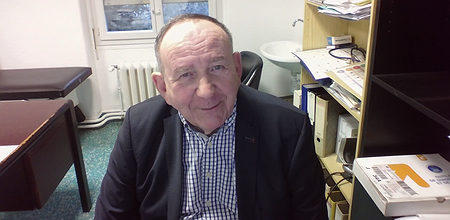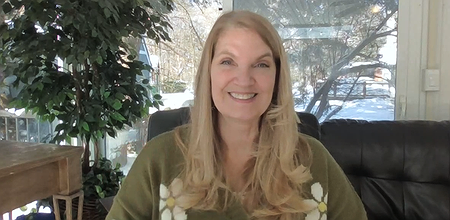- Define the symptoms of psychosis
- Articulate the structure of CBT for psychosis
- Conceptualize hallucinations and ‘delusions’ using the cognitive model of psychosis
- Identify appropriate cognitive and behavioural change strategies for psychosis
Introduction to Cognitive Behavioural Therapy for Psychosis
Dr. Michael Best, Psychologist
Transform resistant symptoms into pathways of relief with effective strategies and techniques.
Excerpt:
- 3h of continuing education
- 21 lessons that last from 5 to 15 minutes each
- 1 certificate of achievement
- 1 PowerPoint
- 1 bibliography
- 1 course evaluation
- 7-day money back guarantee
- Unlimited access
- 96% of participants who completed the satisfaction survey declare they would recommend this course to a colleague
Overview
Some symptoms of psychosis persist despite medication—CBTp offers a structured and evidence-based approach to address them.
When hallucinations, delusional beliefs, or negative symptoms become entrenched, they can significantly hinder recovery and autonomy. Cognitive Behavioural Therapy for Psychosis (CBTp) was specifically developed to support individuals facing this kind of persistent distress. With strong empirical support, CBTp equips clinicians to address the mechanisms maintaining psychotic symptoms and to foster both clinical and personal recovery.
In this 3-hour training, Dr. Michael Best—clinical psychologist and assistant professor at the University of Toronto—provides a clear and rigorous introduction to CBTp. Drawing on current evidence and real case examples, he outlines the core structure of this intervention, along with practical tools to use in clinical settings.
You will be equipped to: - Structure intervention across five treatment phases, from assessment to consolidation, including maintenance sessions and action planning. - Deploy targeted cognitive and behavioural strategies to support clients in reinterpreting hallucinations and delusional beliefs. - Use individualized case conceptualization to guide treatment, promote engagement, and tailor change strategies. - Work from a recovery-oriented perspective, integrating clinical, personal, and functional dimensions.
This training provides a solid foundation for incorporating CBTp into your therapeutic practice—whether working individually or alongside other forms of support.
Accreditation
Collège des médecins du Québec
For physicians who practice psychotherapy, training recognized by the Ordre des psychologues du Québec is automatically considered as activities adopted by the Collège des médecins, in accordance with Article 3 of the Regulation.
For physicians who do not practice psychotherapy, the College evaluates each recognition request based on the following criteria:
- the relevance of the activity to the practice of the profession
- the skills and experience of the trainer
- the quality of the content and its adequacy with the physician's practice
- the pedagogical framework of the activity
- the quality of the documentation provided
- compliance with the training objectives set out in the regulation
- the presence of a certificate of participation or an evaluation
About the expert

Dr. Michael Best, clinical psychologist, is Assistant Professor in the Graduate Department of Psychological Clinical Science at the University of Toronto, Affiliate Scientist at Ontario Shores Center for Mental Health Sciences, and Collaborator Scientist at the Centre for Addiction and Mental Health.
Dr. Best’s research focuses on cognitive mechanisms underlying experiences of psychosis and innovating cognitive behavioral therapies for psychosis. He has co-developed a novel cognitive treatment for internalized stigma, called BOOST, that focuses on helping people with a first episode of psychosis overcome internalized stigma. He has also conducted clinical trials of remotely delivered CBT for psychosis, and examined mechanisms of change during CBTp. Dr. Best is a member of the steering committee for the North American CBTp Network and an executive officer for the Canadian Association for Cognitive and Behavioral Therapies.
Learning objectives
Learning material
A theoretical course illustrated with clinical examples. This course is composed of videos of 5 to 15 minutes each. The PowerPoint of the course to download.
Syllabus
- PowerPoint
-
Symptoms of psychosis
- 1. Presentation
- 2. Basics of hallucinations
- 3. Basics of delusions
- 4. Psychotic disorders
- 5. Recovery
-
Evidence for CBT for Psychosis
- 6. The psychosis continuum and cultural context
- 7. Evidence based studies about CBT and psychosis
- 8. Conceptualization-Driven CBTp
- 9. CBT protocol
- 10. CBTp Values
- 11. Tips for Ethical - Competent CBTp
- 12. Phases of treatment
- 13. Session structure
-
Cognitive conceptualization of Psychosis
- 14. Cognitive change strategies
- 15. Behavioral change strategies
- 16. Cognitive model of hallucinations
- 17. Coping strategies for voices
- 18. The example of Sally- voices hallucinations
- 19. Analysis of delusions
- 20. Case formulation video
- 21. Conclusion
- Bibliography
CE Credits
Download a certificate of successful completion.
Audience
This training is intended for mental health professionals.
Your comments
"Really enjoyable - helpful to understand more about CBT ." (automatically translated)
A social worker
Registration
Ask a question
Do you have a question? Then email us at contact@asadis.net
Frequently asked questions
-
Is there an evaluation at the end of the course?
To validate the achievement of the learning objectives, a final evaluation in the form of true/false questions is required. It must be completed in order to obtain the certificate of completion.
In addition, an optional self-assessment is offered at the beginning and end of the course, allowing you to measure your progress on the targeted skills.
These evaluations are not graded and are intended primarily to support your professional reflection.
-
I have a disability. Can I receive specific support?
Yes! This training is offered as a pre-recorded video format, without subtitles. If you have a disability, we can provide an adapted alternative (technical assistance for viewing or individual supervision). For any request, please contact our disability coordinator at the following address: contact@asadis.net
-
How long do I have access to the course?
After your registration, the course is accessible anytime and from anywhere with unlimited access.
-
When does the course start?
That is entirely up to you! When you buy a course, you'll receive an access link that you can activate when you want.
-
Is there a student rate?
Yes there is! To learn more, email us at contact@asadis.net.
You may also be interested in:
Legal notice
The courses offered by ASADIS are accredited by different professional organisations. In addition, ASADIS is approved by the Canadian Psychological Association to offer continuing education for psychologists. ASADIS maintains responsibility for the program.
The CPA’s approval of an individual, group, or organization as a CE Sponsor or Provider is restricted to the activities described in the approved application or annual report form. The CPA’s approval does not extend to any other CE activity the Sponsor or Provider might offer. In granting its approval, the CPA assumes no legal or financial obligations to Sponsors, Providers, or to those individuals who might participate in a Sponsor or Provider’s CE activities or programs. Further, responsibility for the content, provision, and delivery of any CE activity approved by the CPA remains that of the CE Sponsor or Provider. The CPA disclaims all legal liability associated with the content, provision, and delivery of the approved CE activity.






